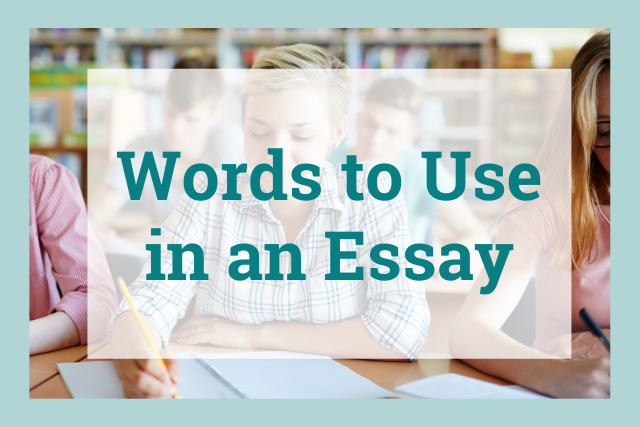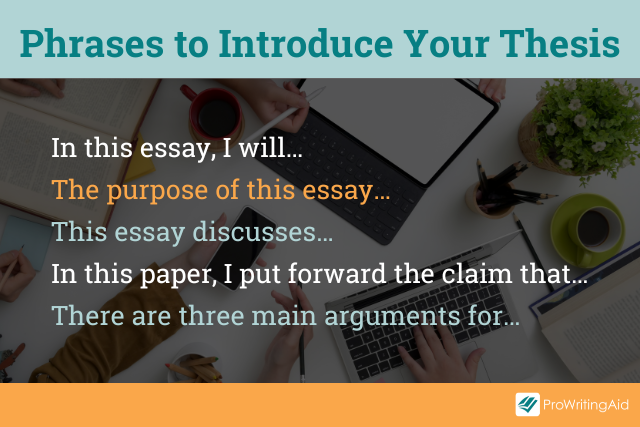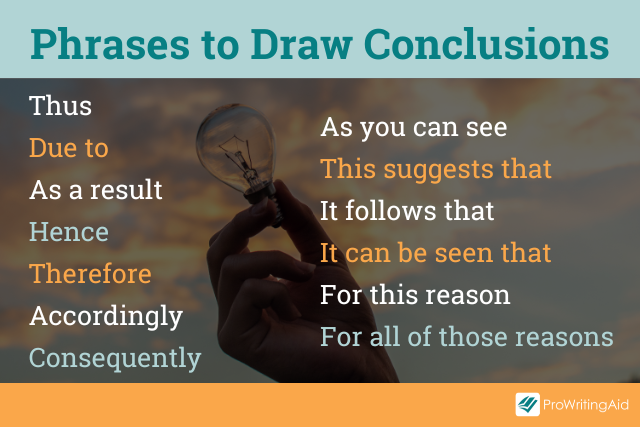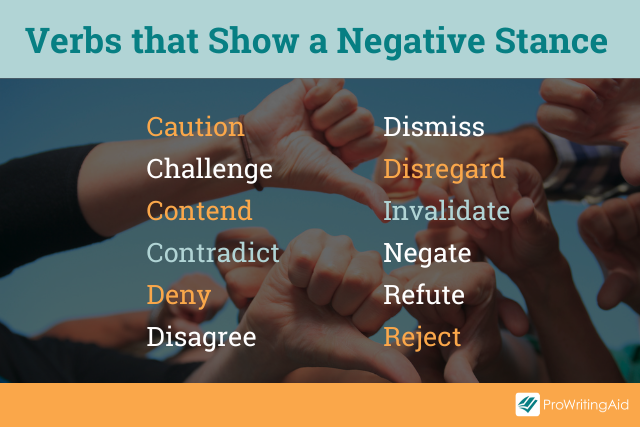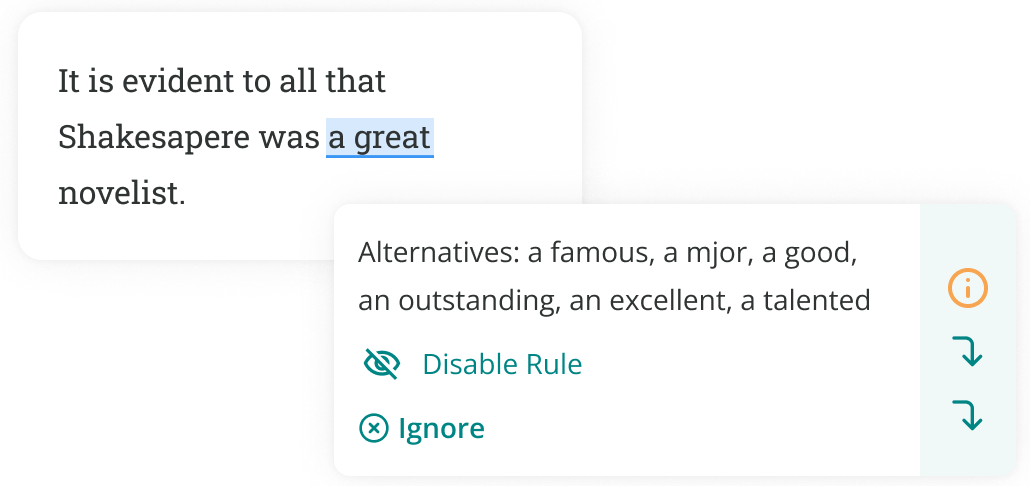It’s not easy to write an academic essay.
Many students struggle to word their arguments in a logical and concise way.
To make matters worse, academic essays need to adhere to a certain level of formality, so we can’t always use the same word choices in essay writing that we would use in daily life.
If you’re struggling to choose the right words for your essay, don’t worry—you’ve come to the right place!
In this article, we’ve compiled a list of over 300 words and phrases to use in the introduction, body, and conclusion of your essay.
Words to Use in the Essay Introduction
The introduction is one of the hardest parts of an essay to write.
You have only one chance to make a first impression, and you want to hook your reader. If the introduction isn’t effective, the reader might not even bother to read the rest of the essay.
That’s why it’s important to be thoughtful and deliberate with the words you choose at the beginning of your essay.
Many students use a quote in the introductory paragraph to establish credibility and set the tone for the rest of the essay.
When you’re referencing another author or speaker, try using some of these phrases:
- To use the words of X
- According to X
- As X states
Example: To use the words of Hillary Clinton, “You cannot have maternal health without reproductive health.”
Near the end of the introduction, you should state the thesis to explain the central point of your paper.
If you’re not sure how to introduce your thesis, try using some of these phrases:
- In this essay, I will…
- The purpose of this essay…
- This essay discusses…
- In this paper, I put forward the claim that…
- There are three main arguments for…
Example: In this essay, I will explain why dress codes in public schools are detrimental to students.
After you’ve stated your thesis, it’s time to start presenting the arguments you’ll use to back up that central idea.
When you’re introducing the first of a series of arguments, you can use the following words:
- First
- First and foremost
- First of all
- To begin with
Example: First, consider the effects that this new social security policy would have on low-income taxpayers.
All these words and phrases will help you create a more successful introduction and convince your audience to read on.
Words to Use in the Body of the Essay
The body of your essay is where you’ll explain your core arguments and present your evidence.
It’s important to choose words and phrases for the body of your essay that will help the reader understand your position and convince them you’ve done your research.
Let’s look at some different types of words and phrases that you can use in the body of your essay, as well as some examples of what these words look like in a sentence.
Transition Words and Phrases
Transitioning from one argument to another is crucial for a good essay.
It’s important to guide your reader from one idea to the next so they don’t get lost or feel like you’re jumping around at random.
Transition phrases and linking words show your reader you’re about to move from one argument to the next, smoothing out their reading experience. They also make your writing look more professional.
The simplest transition involves moving from one idea to a separate one that supports the same overall argument. Try using these phrases when you want to introduce a second correlating idea:
- Additionally
- In addition
- Also
- Secondly
- Furthermore
- Another key thing to remember
- In the same way
- Similarly
- Likewise
- Correspondingly
Example: Additionally, public parks increase property value because home buyers prefer houses that are located close to green, open spaces.
Another type of transition involves restating. It’s often useful to restate complex ideas in simpler terms to help the reader digest them. When you’re restating an idea, you can use the following words:
- In other words
- To put it another way
- That is to say
- To put it more simply
Example: “The research showed that 53% of students surveyed expressed a mild or strong preference for more on-campus housing. In other words, over half the students wanted more dormitory options.”
Often, you’ll need to provide examples to illustrate your point more clearly for the reader. When you’re about to give an example of something you just said, you can use the following words:
- For instance
- To give an illustration of
- To exemplify
- To demonstrate
- As evidence
Example: Humans have long tried to exert control over our natural environment. For instance, engineers reversed the Chicago River in 1900, causing it to permanently flow backward.
Sometimes, you’ll need to explain the impact or consequence of something you’ve just said.
When you’re drawing a conclusion from evidence you’ve presented, try using the following words:
- Thus
- As a result
- Hence
- Therefore
- Accordingly
- Due to
- As you can see
- This suggests that
- It follows that
- It can be seen that
- For this reason
- For all of those reasons
- Consequently
Example: “There wasn’t enough government funding to support the rest of the physics experiment. Thus, the team was forced to shut down their experiment in 1996.”
When introducing an idea that bolsters one you’ve already stated, or adds another important aspect to that same argument, you can use the following words:
- Moreover
- Further
- What’s more
- As well as
- Along with
- Besides
- Not only…but also
- Not to mention
- To say nothing of
- Another key point
Example: The volcanic eruption disrupted hundreds of thousands of people. Moreover, it impacted the local flora and fauna as well, causing nearly a hundred species to go extinct.
Often, you’ll want to present two sides of the same argument. When you need to compare and contrast ideas, you can use the following words:
- On the one hand / on the other hand
- Conversely
- However
- Alternatively
- In contrast to
- On the contrary
- Whereas
- By contrast
- In comparison
Example: On the one hand, the Black Death was undoubtedly a tragedy because it killed millions of Europeans. On the other hand, it created better living conditions for the peasants who survived.
Finally, when you’re introducing a new angle that contradicts your previous idea, you can use the following phrases:
- Having said that
- That said
- Even so
- Then again
- Differing from
- Granted
- Despite
- Yet
- In spite of
- While
- With this in mind
- Provided that
- Nevertheless
- Nonetheless
- Notwithstanding
- Admittedly
Example: Shakespearean plays are classic works of literature that have stood the test of time. Having said that, I would argue that Shakespeare isn’t the most accessible form of literature to teach students in the twenty-first century.
Good essays include multiple types of logic. You can use a combination of the transitions above to create a strong, clear structure throughout the body of your essay.
Strong Verbs for Academic Writing
Verbs are especially important for writing clear essays. Often, you can convey a nuanced meaning simply by choosing the right verb.
You should use strong verbs that are precise and dynamic. Whenever possible, you should use an unambiguous verb, rather than a generic verb.
For example, alter and fluctuate are stronger verbs than change, because they give the reader more descriptive detail.
Here are some useful verbs that will help make your essay shine.
Verbs that show change:
- Alter
- Accommodate
- Evolve
- Fluctuate
- Generate
- Transform
- Transition
- Vary
Verbs that relate to causing or impacting something:
- Constrain
- Control
- Govern
- Ignite
- Impact
- Influence
- Inhibit
- Initiate
- Instigate
- Introduce
- Promote
- Provoke
- Stimulate
- Trigger
Verbs that show increase:
- Advance
- Develop
- Enlarge
- Exceed
- Extend
- Facilitate
- Improve
- Implement
- Maximize
Verbs that show decrease:
- Alleviate
- Cease
- Decline
- Depress
- Descent
- Deteriorate
- Minimize
- Subside
- Reduce
Verbs that relate to parts of a whole:
- Comprises of
- Is composed of
- Constitutes
- Encompasses
- Includes
-
Incorporates
Verbs that show a negative stance:
-
Caution
- Challenge
- Contend
- Contradict
- Deny
- Disagree
- Dismiss
- Dispute
- Disregard
- Invalidate
- Misconstrue
- Negate
- Refute
- Reject
- Question
Verbs that show a positive stance:
- Admit
- Advocate
- Affirm
- Assert
- Complement
- Emphasize
- Endorse
- Highlight
- Declare
- Maintain
- Substantiate
- Suggest
- Support
- Underscore
- Uphold
- Validate
- Verify
Verbs that relate to drawing conclusions from evidence:
- Allude
- Attest
- Confirm
- Convey
- Corroborate
- Demonstrate
- Document
- Entail
- Establish
- Hint
- Imply
- Indicate
- Present
- Reveal
- Signify
- Summarize
- Surface
- Unearth
- Yield
Verbs that relate to thinking and analysis:
- Analyze
- Appraise
- Assess
- Believe
- Clarify
- Concede
- Contend
- Consider
- Contemplate
- Define
- Derive
- Determine
- Diagnose
- Discuss
- Dissect
- Evaluate
- Examine
- Explore
- Hypothesize
- Identify
- Ignore
- Infer
- Interpret
- Investigate
- Observe
- Perceive
- Postulate
- Presume
- Recognize
- Refer
- Scrutinize
- Speculate
- Surmise
- Theorize
Verbs that relate to showing information in a visual format:
- Denote
- Depict
- Describe
- Display
- Illustrate
- Portray
- Represent
- Typify
Useful Adjectives and Adverbs for Academic Essays
You should use adjectives and adverbs more sparingly than verbs when writing essays, since they sometimes add unnecessary fluff to sentences.
However, choosing the right adjectives and adverbs can help add detail and sophistication to your essay.
Sometimes you’ll need to use an adjective to show that a finding or argument is useful and should be taken seriously. Here are some adjectives that create positive emphasis:
- Beneficial
- Clear
- Effective
- Important
- Invaluable
- Main
- Major
- Persuasive
- Relevant
- Significant
- Strong
- Successful
- Unbiased
- Useful
- Valid
- Valuable
Other times, you’ll need to use an adjective to show that a finding or argument is harmful or ineffective. Here are some adjectives that create a negative emphasis:
- Biased
- Controversial
- False
- Flawed
- Insignificant
- Invalid
- Irrelevant
- Limited
- Minor
- Questionable
- Unnecessary
- Unrealistic
Finally, you might need to use an adverb to lend nuance to a sentence, or to express a specific degree of certainty. Here are some examples of adverbs that are often used in essays:
- Accordingly
- Adequately
- Barely
- Briefly
- Certainly
- Completely
- Comprehensively
- Consequently
- Entirely
- Exhaustively
- Extensively
- Generally
- Hardly
- Initially
- Nearly
- Possibly
- Presumably
- Probably
- Regularly
- Respectively
- Scarcely
- Surprisingly
- Thoroughly
- Typically
Using these words will help you successfully convey the key points you want to express. Once you’ve nailed the body of your essay, it’s time to move on to the conclusion.
Words to Use in Your Essay Conclusion
The conclusion of your paper is important for synthesizing the arguments you’ve laid out and restating your thesis.
In your concluding paragraph, try using some of these essay words:
- In conclusion
- To summarize
- To sum up
- In summary
- In a nutshell
- In brief
- In short
- In essence
- All in all
- Given the above
- As described
- All things considered
- Finally
- Lastly
Example: In conclusion, it’s imperative that we take action to address climate change before we lose our coral reefs forever.
In addition to simply summarizing the key points from the body of your essay, you should also add some final takeaways. Give the reader your final opinion and a bit of a food for thought.
To place emphasis on a certain point or a key fact, use these essay words:
- Unquestionably
- Undoubtedly
- Particularly
- Especially
- Importantly
- Singularly
- Chiefly
- Namely
- Conclusively
- It should be noted
- Above all
- Ultimately
- On the whole
Example: Ada Lovelace is unquestionably a powerful role model for young girls around the world, and more of our public school curricula should include her as a historical figure.
These concluding phrases will help you finish writing your essay in a strong, confident way.
How to Improve Your Essay Writing Vocabulary
There are many useful essay words out there that we didn’t include in this article, because they are specific to certain topics.
If you’re writing about biology, for example, you will need to use different terminology than if you’re writing about literature.
So how do you improve your vocabulary skills?
The vocabulary you use in your academic writing is a toolkit you can build up over time, as long as you take the time to learn new words.
One way to increase your vocabulary is by looking up words you don’t know when you’re reading.
Try reading more books and academic articles in the field you’re writing about and jotting down all the new words you find. You can use these words to bolster your own essays.
You can also consult a dictionary or a thesaurus. When you’re using a word you’re not confident about, researching its meaning and common synonyms can help you make sure it belongs in your essay.
Don’t be afraid of using simpler words. Good essay writing boils down to choosing the best word to convey what you need to say, not the fanciest word possible.
Finally, you can use ProWritingAid’s synonym tool or essay checker to find more precise and sophisticated vocabulary. Click on weak words in your essay to find stronger alternatives.
There you have it: our compilation of the best words and phrases to use in your next essay. Good luck!
Take your writing to the next level:
20 Editing Tips From Professional Writers
Whether you are writing a novel, essay, article, or email, good writing is an essential part of communicating your ideas.
This guide contains the 20 most important writing tips and techniques from a wide range of professional writers.

Loading
Students often have a question, how to make an essay interesting. I know the answer, and in this blog, you will going to read the answer or the method by which you can make an interesting essay. But before delving into the answer, first, we should need to know the basic elements of the essay. An essay is comprised of many things namely, essay words, phrases, sentences, ideas, expressions, research, format etc. These things together make an appealing essay. But the most important thing out of all these is essay words. So, today in this blog we will focus on essay words mainly.
Words to use in an essay introduction
An introduction is the first thing a reader sees in your essay. Most of the students or budding writers believed that readers only focus on the central part of the essay. But, that is not true at all. The introduction has the main role in any type of writing as it creates the first impression on the reader. If your intro is not well written, no one will bother for the central part.
Writing a perfect and eye-catching introduction is quite challenging for students. Even the first word or sentence has a lot of potentials to create a good or bad impact on reader’s mind, so be thoughtful while using the words for your introduction.
To simply your selection of essay words, I have written some of the most important words and phrases to use in an essay introduction.
Essay words and phrases list for an introduction
- Myriad
- Initiate
- Onset
- To begin with
- Complex problem
- Foremost
- Challenging
- Significance
- Importance
- The purpose of this essay
- This essay discusses
- Central idea of this essay
- They key elements in this essay
- The need for writing this essay
- This topic is important as
- The technique used in the essay
- The key problem discussed
- As far as we know
- You all must have an idea
- Aim of writing this essay
- The main objective of writing
These are the common essay words and phrases one can use while composing the introduction section of any essay. Moreover, one more thing you need to look out is that your essay introduction should start with a hook sentence or quotation. Most of the writers make or use famous proverbs at the beginning of the essay or any piece of writing. You might have read various novels that start with a proverb or catchy line, or line from the poetry of some famous poet. For example, Chinua Achebe’s novel “Things Fall Apart” marks the beginning with a line
Turning and turning in the widening gyre
The Falcon cannot hear the falconer;
Things fall apart: the center cannot hold:
Mere anarchy is loosed upon the world.
These lines are taken from Lord Byron’s poem “The Second Coming”. The purpose of using these lines is to set the tone for the whole novel. Similar kind of technique can be used by essay writers for their essays.
Read Also- Ask us for the Curtin University Assignment Help.
Words to use in the body of the essay
After completing the introduction of the essay, the next thing is the body of the essay. Body of the essay is a place where a writer can put up arguments and supportive evidence. Write the body into several parts and each part should have a discussion of viewpoint with substantial evidence to support.
Along with good evidence and viewpoint, you need to have good words to express and impress the readers with your point of view. You writing should let the readers believe in you. You can use the following words in order to write a good body of your essay.
Essay words list for the body of the essay
- Firstly..Secondly…Thirdly…
- To start with the argument
- In my opinion
- On the one hand…On the other hand
- Contrastingly
- Contradictory
- Likewise
- Similarly
- In spite of / Despite
- Furthermore
- Moreover
- Besides
- To evaluate
- Notwithstanding
- I begin with an argument..
These are the words you can use while writing the body of your essay. Remember to use them judiciously, don’t put them if they are not making sense. Read what to write in the body of five-paragraph essay to know how to write it.
Words to use in an essay while writing the conclusion
Now you are done with the first two paragraphs, it is time to write a proper conclusion. Most of you are thinking, why waste time in conclusion, it should just be a summary of the whole work. That is not the case. The conclusion is as important as any other part of the essay. You might lose some serious marks if not write it correctly. Below you may see some words to use while writing the conclusion of the essay.
Essay words list to use in the conclusion
- Concluding everything
- In a nutshell
- To conclude
- To sum up things
- In short
- In summary
- It has been shown that
- Thus
- Therefore
- To summarize the whole essay
- In brief
- To end up
- To take stock
- So,
- In the end
- At last
- To wrap up the things
Use these words in conclusion and end your essay on a pleasant note.
Other than these words one must need to focus on the vocabulary of the essay. Next section will be about the vocabulary to use in an essay.
A vocabulary to use in an essay
The vocabulary of an essay is the general essay words that need to be used in the whole essay at different places as per the requirements. Essay vocabulary has certain words that will help by enhancing your writing style. Have a look at them
| Accept | Significance | Certain | Justify | Judicious | Persuasive | Precede |
| Accordingly | Raised | Introduction | Latter | Narrative | Nevertheless | Notwithstanding |
| Actually | Analogy | Initially | Instance | Intend | Particular | Paradigm |
| Additionally | Analysis | Illustrate | Assumption | Implicit | Include | Indicate |
| In addition | Apply | Explicit | Extend | Elucidate | Extent | Former |
| Admit | Assess | Explain | Exception | Exemplify | Exemplary | Exclude |
| Adjacent | Amplify | Description | Dubious | Enumerate | Equal | Equivalent |
| Affirmative | Alternative | Contrary | Consequently | Conversely | Decline | Deduce |
| Negate | Catalogue | Conclude | Conditional | Conclusion | Conjunction | Connect |
| Negatively | Brief | Claim | Clarification | Clarify | Clause | Coherence |
| Alleged | Generalization | Evident | Evaluate | Compound | Consistent | Denotation |
| Furthermore | Example | Establish | Presumably | Define | Consider | Comparison |
| Opinion | Parallel | Inevitable | Paramount | Infer | Compare | Connotation |
| Definitely | Essential | Eventual | Foremost | Induce | Paradox | Obvious |
| Phrase |
These are more than enough essay words that one can use in essay writing. Such words convey your ideas and thoughts more precisely in the essay. Make yourself familiar with these words and write a masterpiece for yourself. You can also refer to Owlcation to get more tips on essay writing. There you will find some more ways of writing an essay.
Different types of essay writing
Now you have understood about the essay words, now it is time to identify what type of essay you have to write. Yes, you heard it right. Essays are of different types as per the need and subject. Your type of essay depends upon the goal. Whether you want to describe something, narrate an experience or story, explain an issue or convince someone. So, let us have a look at different types of essays.
Read Also- Tips to get Successful Academic Career.
Narrative essay
Narrative essays are used to tell a story about a real-life experience. Often students think that such essays are easy to write but they are challenging. The main challenge is to self introspect. You might face difficulty while writing about yourself. Sometimes you may not get the right words to define your personality other time you are not completely aware of yourself.
The aim of a narrative essay is to involve the readers as much as possible, that can be only possible if you provide description vividly. To know how to write narrative essay read narrative essay outline.
Descriptive essay
This type of essay is almost similar to a narrative essay, here you have to paint a picture in the reader’s mind through your words. Here the work of a writer is to describe a place, object, memory or a person. A descriptive essay is not just a mere description, rather it consists of hidden or deep meaning. While writing a descriptive essay, remember to show rather than telling anything. Use sensory words, colourful details to make things felt. Your essay should appeal to the emotions of the reader. Read more about descriptive essay here: Key to write a descriptive essay.
Expository essay
If you are good in collecting facts, you can write a good expository essay. Expository essays are informative essays. In this type of essay, information presents a good analysis of a topic. Here a writer uses facts, statistical data and lots of examples to explain the topic perfectly. Your essay can be an eyesore if your facts are wrong. So choose from the write sources or else take online essay help from experts. Remember, not to make an emotional appeal in an expository essay, as they are completely factual.
Persuasive essay
As the name suggests, these essays are used to persuade readers. Write aims to convince the reader with his/her point of view. Here also you have to take the help of facts and figures and build your case with it. Your essay should adhere to logic and rationality. The writer needs to provide all sides of the argument but clearly tells why his/her viewpoint is more suitable or correct.
These are the four major types of essay writing in academics. Gain perfection in them or take essay help online from allassignmenthelp.com. Other than academic essays one more type of essay is there, that is a college application essay, this type of essay comes under the category of non-academic writing. Such essays are used for taking admission in college. You can get help in college application essay as well from allassignmenthelp.com.
Allassignmenthelp.com – A place to get high scoring essays
It evident that every student wants to score excellently in academics. No one prefers to attain poor grades. But, even after doing a lot of hard work, many students fail to make a good impact on scorecards. Most of the students fail to write impeccable essays. Thus, lose some important marks. Moreover, those who write well, fail to stick to the deadlines. That is why it would be a wise decision to take online essay help from allassignmenthelp.com. Here, you will find the essay writers who are having great expertise in composing unblemished essays. Our writers carry out research and then write essays for students. Along with essay help, you will get the following benefits as well.
- Heavy discounts on all types of academic writing services. We provide discounts as well as cashback on all types of assignments.
- Information from a trusted source. Our writers take down the essay work by collecting the information from reliable websites and books.
- No plagiarism in the work provided by us. You will get Turnitin report as well along with the assignment.
- Get your work without any delay. We will deliver the assignments to students as per the date of delivery mentioned by them. Our writers never cross the deadlines.
There are more benefits and services you can take from allassignmenthelp.com. Visit our main website and get your essay now. To order your essay instantly click the button below.


